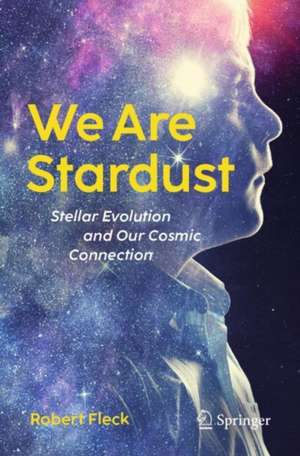We Are Stardust: Stellar Evolution and Our Cosmic Connection
Autor Robert Flecken Limba Engleză Paperback – 20 sep 2024
Preț: 146.77 lei
Nou
Puncte Express: 220
Preț estimativ în valută:
28.08€ • 30.63$ • 23.68£
28.08€ • 30.63$ • 23.68£
Carte disponibilă
Livrare economică 03-17 aprilie
Livrare express 20-26 martie pentru 46.47 lei
Preluare comenzi: 021 569.72.76
Specificații
ISBN-13: 9783031672743
ISBN-10: 3031672747
Pagini: 150
Ilustrații: Approx. 150 p.
Dimensiuni: 155 x 235 x 15 mm
Greutate: 0.31 kg
Ediția:2025
Editura: Springer Nature Switzerland
Colecția Springer
Locul publicării:Cham, Switzerland
ISBN-10: 3031672747
Pagini: 150
Ilustrații: Approx. 150 p.
Dimensiuni: 155 x 235 x 15 mm
Greutate: 0.31 kg
Ediția:2025
Editura: Springer Nature Switzerland
Colecția Springer
Locul publicării:Cham, Switzerland
Cuprins
Introduction.- In the Beginning.- Stellar Evolution: The Life Cycle of Stars.- From Dust to Us: Our Cosmic Connection.- Final Thoughts.
Notă biografică
Dr. Robert Fleck is an emeritus professor of Physics and Astronomy in the Department of Physical Sciences at Embry-Riddle Aeronautical University in Daytona Beach, FL, where for four decades he developed and taught a large number and a wide variety of undergraduate and graduate courses in physics, astronomy, general science, and history of science. For inspiring his students with his passion and enthusiasm for teaching and lifelong learning, he received the University Outstanding Teaching Award in 2000 and 2015, as well as over a dozen faculty appreciation awards from graduating senior classes. Dr. Fleck is a NASA and National Science Foundation supported star and planet formation theorist; his focus in the history of science is on the cultural parallels of science, particularly those pertaining to the visual arts.
Textul de pe ultima copertă
This concise and accessible book explains one of the most profound and inspiring discoveries ever made, namely, the fact that we ourselves—and all we see around us—are a natural product of the workings and wonders of the Universe, tied directly to distant events spread across space and time reaching back to the beginning, back to the Big Bang, and continuing through the birth and death of successive generations of stars. Modern science has shown that, in a very real and profound way, we are intimately connected to the Cosmos: we are, as Joni Mitchell tells us in her song Woodstock, stardust—in a very real sense, children of the stars—star folk made from chemical elements (“starstuff”) cooked by nuclear reactions in stellar furnaces throughout the various stages of stellar evolution. Life as we know it is an inevitable consequence of the life cycle of the stars. Our story begins at the beginning with the Big Bang some 13.8 billion years ago when, during the first three minutes in the history of the Universe, all of the hydrogen and most of the helium, by far the most abundant elements in the Universe, formed from a cooling plasma of protons, neutrons, and electrons. We then trace the life cycles of the stars from birth to death highlighting the synthesis in the stars of the heavier chemical elements so essential to life, along the way touching on many of the hot topics in astrophysics today including exoplanets, supernovae, pulsars, black holes, white dwarfs, and, since these conditions are found throughout the Galaxy, life in the Universe. The reader, awed by the power and beauty of this cosmic perspective, will leave with a better understanding and appreciation of our true cosmic connection. Surprisingly, despite its significance, this fascinating story of our connection to the stars has largely gone unnoticed outside a small circle of scientists. Understanding that the stuff we are made of traces its origin to nuclear processes accompanying the Big Bang, and thereafter to billions of years of the birth and death of generation after generation of stars, is an important and beautiful story that deserves more attention. Intended for a broad audience, this book provides inspiring reading for all students and afficionados of science.
Caracteristici
Provides a non-technical account of our connection to the Cosmos, accessible to a general audience Gives a concise survey of the synthesis of chemical elements from the birth of the universe to the death of the stars Explains in accessible prose the processes that produce the elements that make up our world and ourselves
